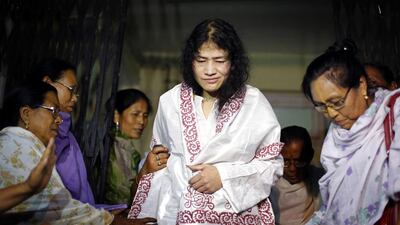NEW DELHI // India’s supreme court has removed the legal immunity that the armed forces have enjoyed for decades, dealing a severe blow to a law that gives troops in “disturbed areas” of the country extrajudicial powers.
Under the Armed Forces Special Powers Act (AFSPA), soldiers enjoy impunity when operating in parts of the country that witness insurgency or civil revolt. These areas, at present, include the states of Assam, Jammu & Kashmir, Nagaland, and parts of Manipur, Arunachal Pradesh and Meghalaya.
The act’s permission of “excessive or retaliatory force” by the army or police was unacceptable, the supreme court’s two-judge bench said on Friday. Deploying the AFSPA for years on end “would mock at our democratic process”, said judges Madan Lokur and Uday Lalit in an 85-page judgement.
The decision came in response to multiple petitions that demanded investigations into 1,528 cases of killings by army troops in the state of Manipur between 2000 and 2012.
Under the act, the army has been accused of getting away with numerous crimes, including rape, torture and murder, in the alleged interests of national security.
In Jammu & Kashmir alone, according to Amnesty International last year, roughly 43,000 people – militants as well as civilians – have been killed by armed forces under the protection of the law.
The verdict undercuts a law that has been in effect since 1958, when then-prime minister Jawaharlal Nehru was battling India’s first separatist insurgency in the north-eastern state of Nagaland.
Even Nehru realised that it would take more than the AFSPA to secure peace and cooperation from the Nagas, the people of Nagaland.
“We always have to remember that the real solution will require a political approach and an attempt to make the Nagas feel that we are friendly to them and that they can be at home in India,” Nehru wrote in a 1956 letter to the then-chief minister of Assam.
The act was an extension of an ordinance issued in colonial India in 1942, after the secretary of state for India, Leo Amery, wrote to then-British prime minister Winston Churchill that swift action was required to quell the Indian independence movement.
“To appease them or delay in striking at them can only discourage the army and all the loyal elements,” Amery wrote.
Over time, opposition has built up against the special powers act. In the most notable display of opposition, Irom Sharmila, a political activist from Manipur, has been on hunger strike since November 2000, demanding a repeal of the act. Ms Sharmila has been force fed for more than 15 years, through a nasal feeding tube, under the instructions of the state.
Ms Sharmila has not responded to Friday’s verdict.
The supreme court refused to accept that a “warlike situation” has prevailed in the north-east for “the last almost six decades”, and it ordered the federal Central Bureau of Investigation (CBI) to open inquiries into the 1,528 killings that were alleged to have occurred in Manipur.
“Before a person can be branded as a militant or a terrorist or an insurgent, there must be the commission or some attempt or semblance of a violent overt act,” the court said.
The ruling, said one major in the Indian army, who asked not to be named, risks impairing the operations of soldiers in sensitive areas.
“The court’s judges, and civilians in general, don’t understand, I think, what it’s like to work in such situations,” he said. “These aren’t situations where you can patiently evaluate people over several days. Sometimes you have to make quick decisions, and for every wrong decision that might be made, there are dozens of correct decisions that we make.”
But Sushant Kumar Singh, a former Indian army lieutenant-colonel, said that the supreme court, if anything, had not gone far enough.
“They should have removed the law entirely,” Mr Singh said. “So many government committees have recommended the removal of this act.”
As it stands, the court’s ruling is tepid and vague, he added. “All it means is, every such case that is suspected of being an extrajudicial killing has to be subject to a formal inquiry. That’s what the ruling says.”
The supreme court has missed an opportunity to rescind the act altogether, Mr Singh said.
“Really, the court is the only institution that can do it, because parliament won’t,” he said. “Over the years, governments have tied the act too closely to notions of nationalism and patriotism. If we want parliament to rescind this law, it will never happen.”
ssubramanian@thenational.ae

